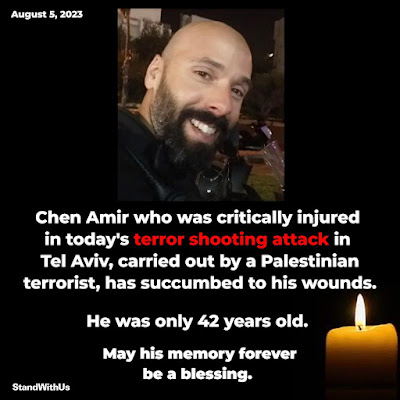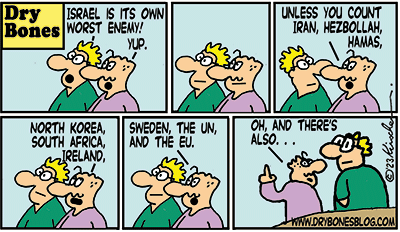The Pro-America Case for Ending Aid
Indeed, even 3% of a state budget is no trivial matter and would presumably come at the expense of other things. But in absolute terms, Israel’s budget itself has been growing every year by sums of this magnitude, in line with GDP growth. It is hard to believe that given its current trajectory of growth, Israel could not shoulder a gradual drawdown of aid. It has enough wealth to do without Uncle Sam’s pocketbook.J Street is crossing a bright red line
We disagree with Goldberg’s claim that “Taking away that $3.8 billion would not increase Israel’s freedom of action.” Israel used to make policy decisions independently of the United States. In 1956, when it received no American military aid, Israel together with the United Kingdom and France invaded Egypt, much to the chagrin of the Americans. And the Eisenhower administration used economic aid as leverage in compelling Israeli withdrawal.
After it started taking military assistance, Israel grew much more deferential to Washington. For instance, the George H.W. Bush administration successfully pressured Prime Minister Yitzhak Shamir not to retaliate after Iraq launched Scud missiles into Israel during the Gulf War. The aid has also made Israel more reluctant to take forceful action against Iran’s nuclear program when faced with an American red light, such as that given by the Obama administration in 2012. There is no question that Israel has taken American dollars at the expense of its independence.
Indeed, an IDF less dependent on the United States would have more freedom of action against Iran and its Arab proxies, and this would redound to the advantage of both countries. Israel would be better prepared to handle its most acute threats and the United States its own, making each country more secure.
Ending military aid is not meant to punish or weaken Israel. On the contrary, it’s meant to reward and strengthen it. As has been the case for decades, assistance makes the United States Israel’s patron and Israel the United States’ client. Rather, they should be two independent, but nonetheless closely aligned, peers. Paring back aid will modernize their relationship.
There is no question that Israel has taken American dollars at the expense of its independence.
Another objection was raised by Yadlin and Golov, who argue that “More than anything, the aid symbolizes America’s commitment to Israel’s security …” Perhaps the aid is a symbol, but we argue that Israel’s enemies are best deterred when it demonstrates its willingness to use decisive force to protect itself. At the same time, U.S. policies in the past few years have done much to provoke Israel’s enemies and undermine its deterrence. For example, when Washington courts Tehran, American officials implore the mullahs for a nuclear deal and float the idea of a “reassessment” of relations with Israel. Stronger policies in practice against real threats would increase deterrence much more than any symbolism of military aid can. On the contrary, an Israeli initiative to phase out aid, making it clear that Israel feels confident and independent, would itself be of strong symbolic value.
Finally, doing so will further discredit the claim that Israel is a strategic liability. Once Israel receives no more American tax dollars, Americans will consider it an even stronger partner that costs the United States nothing. This will be especially so on the right, which admires countries that are powerful and self-sufficient, such as the United Kingdom and Australia, both of which receive no military aid. As long as Israel remains a dependent, it will never make it into this elite club.
More and more Americans who are fundamentally sympathetic to Israel are increasingly antagonistic to the idea of foreign aid in general. They do not understand why a rich country like Israel is receiving so much. The reverse is also true: It is precisely Israel’s image as a strong and independent nation that takes care of itself that attracts the admiration and political support of Americans.
So far congressional calls to cut aid have been limited to progressive “Squad” members like Rashida Tlaib, other left-wing Democrats, and libertarians like Rep. Thomas Massie, R-Ky. Yet reducing Israel’s annual appropriation doesn’t have to be retaliation for killing Palestinian terrorists or part of a knee-jerk aversion to foreign aid. It should be a joint decision, preferably initiated by an Israeli proposal.
U.S. officials should understand that the best way to ensure a peaceful, secure Israel and a strong America is to make sure both countries spend money sensibly and strengthen their own military capabilities. Right now, the status quo is lacking.
Last week, I joined more than 1,000 Jewish community leaders for an emergency briefing hosted by the Union for Reform Judaism following the Knesset’s passage of the “reasonableness” bill.Reuven Rivlin: Israel must draw common rules, before it's too late
Among the presenters was Rabbi Gilad Kariv, a current Knesset member from the Labor Party – the first Reform rabbi to serve in Knesset – and a trusted voice on core issues that matter to the Reform Jewish community.
Kariv didn’t mince words and passionately urged us to stand resolutely with Israelis protesting the judicial overhaul.
Then he was asked a question that many American rabbis have fielded from congregants, and has recently appeared in various op-ed pieces: Should America condition foreign aid to Israel?
Kariv’s message was clear. “Leave the foreign aid aside.”
“We are not allowed to forget the existential threats…We need to understand that there are a few red lines that we cannot cross. Conditioning foreign aid is one of those bright red lines.”
This is a critical distinction for pro-Israel Americans to internalize. There are many ways we can oppose dangerous moves by this government and stand with our Israeli friends. But the security challenges facing Israel are dire, and conditioning the aid that protects Israelis from those threats will not help them – it will only put them in greater danger.
Kariv is not alone in this perspective. President Biden and Israel’s strongest supporters in Congress have expressed their frustration over the overhaul while opposing efforts to jeopardize security aid. In fact, Rep. Ritchie Torres, a Democrat from New York, recently published the affirmative case for security assistance.
Yet not everyone agrees.
J Street sees America’s lifesaving aid as a lever to punish the Israeli government and is fighting against Gilad Kariv, President Biden, and the overwhelming majority of the Democratic party on this most critical point.
In fact, J Street is currently lobbying for a bill to add conditions on how and where Israel can use security aid.
Bernie Sanders, a top J Street endorsee, proposed an amendment in July to condition all security funding for Israel.
J Street endorsees are consistently among the most vocal proponents of conditioning aid.
Jeopardizing Israel’s security jeopardizes Israeli lives. As Kariv points out, this is “a bright red line” that J Street has crossed.
But that is only half the equation. A strong Israel is vital for America. This aid is an investment that helps them and helps us in countless ways, as Rep. Torres detailed in his piece.
Indeed, were we not shocked when Basic Laws were changed for political needs, sometimes to increase the number of acting ministers, sometimes to create a rotation in the prime ministerial position and sometimes to form a rotation government?
If your constitutional change is deemed legitimate, but my constitutional change is a non-starter, and if your violent protest is a legitimate democratic demonstration, where all detained protestors are released, whereas my violent protest is a criminal act of rebellion, with dozens arrested even before it starts and hundreds arrested by its end – then we have no rules to play by, and the point of no return is growing closer.
Therefore, before we argue or even agree to hold honest dialog, let's first agree on the rules to which we must abide. Let's hold firm as we did in the past. When each side is convinced that the police work for the other side - let's establish legal agreements on the right to protest and its limits, on what’s allowed and prohibited in a demonstration and primarily on uniform standards of law enforcement.
When the core issue of constitutional laws, including the concept of separation of powers and the interaction between them, is disputed, let's at least establish procedural agreements (supermajority, safeguards to Basic Laws, special legislative procedures, etc.) for the Basic Law: The Judiciary so that we can better manage the debate.
Even in days when we were most divided, during the Oslo Accords or the disengagement from Gaza, we sat in the Knesset as rival members of parliament and managed to reach agreements, sometimes only on procedures but often also on important decisions.
Political rivals like Yitzhak Levy, Moshe Shahal, Dov Khenin, Aryeh Eldad, Mohammad Barakeh, Uri Ariel, Chaim Oron and even myself, as well as many other good people, reached agreements without giving up our ideological positions.
Perhaps a "rule forum" is needed, a group of former politicians who know how to communicate and negotiate with the opposing political side, even during times of deep divisions.
Together with a group of seasoned jurists (from the Knesset, government offices and even research institutions), who specialize in shaping political procedures into legal tools, this forum could help all of us crawl back from the edge.
Such a forum would not deal with ideological decisions, but only with the rules according to which things should be held; it wouldn’t produce reports no one reads, but would prepare 2-3 practical legislative proposals that would help bring us back to common ground before it’s too late.
Netanyahu on U.S. media blitz says judicial overhaul will stop soon
Israel's Prime Minister Netanyahu told Bloomberg in an interview on Sunday that the judicial overhaul process will "probably stop" after a reform is made to the judicial selection committee.
Senior correspondent Owen Alterman explains what this latest comment signals, and adds some much needed context.
























.jpg)
























.jpeg)



